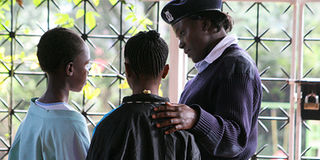Teenage sex study shock for parents

A female police officer talks to victims of underage sex. A new report has indicated that girls as young as 12 are selling their bodies for petty things such as mobile phone airtime, chips and even sanitary pads
Girls as young as 12 are selling their bodies for petty things such as mobile phone airtime, chips and even sanitary pads.
And many are opting not to use protection, even though they are fully aware of the dangers of unsafe sex.
They are also sleeping with different partners: Some admitted having as many as six sexual partners in six months. What’s more, they’re spending almost as much energy keeping their actions secret from parents and guardians, a new survey revealed on Tuesday.
Instead, they prefer to get and share information about their increasingly risky sexual behaviour with friends, says the study by the Centre for the Study of Adolescence.
The study was carried out in two phases, one in June 2008 and the other in May 2009.
The figures revealed at least half of students surveyed had engaged in unprotected sex at least once.
The study carried out among both urban and rural youths aged between 12 and 19 years, showed a worrying trend of increased sexual activity. The survey involved 4,766 students in 125 secondary schools nationwide.
And despite youth-friendly policies like the Adolescent Reproductive Health and development policies, the Children’s Act, and the Sexual Offences Act, teenagers remain ignored by behaviour change programmes aimed at combating Aids.
The survey found that in poverty-stricken areas, young people routinely exchanged sexual favours for money or gifts.
“The children are exchanging sex for petty items like cellphone airtime, chips, pocket money and girls exchanging it for sanitary towels,” said Ms Rosemary Onyando, executive director of the Centre for the Study of Adolescence.
Teens in the survey did not openly disclose whether they had personally received gifts for sex. But half of those interviewed said they had friends who did.
The study also found there was an increase in knowledge about sex among the youth but they were unwilling to discuss sex openly. It also revealed that adults were not the young people’s primary source of information about sex.
“Only 30 per cent of boys were willing to discuss sex with their parents compared to 50 per cent of the girls in the same group,” said Mr Martin Omondi, an official with the NGO that carried out the study.
Surprisingly, though the teenagers acknowledged knowing about the risks of pre-marital sex, they not only engaged in it but also opted not to use protection.
“Most say they want to delay the first sexual experience, yet they indicate that using condoms is unpleaseant,” said Ms Onyando.
Teenage pregnancies, which are the leading cause of school drop-out cases among girls, provided a clearer insight into teenage relationships. At least one in 20 boys in high school reported to have made a girl pregnant, and an equal number had coerced girls into having sex with them.
Due to the missing links in free access to sex information for the youth, young people in the study admitted to having at least six sexual partners in six months.
Nearly 65 per cent of those surveyed recommended that sex education be taught in schools and that parents be invited to forums where sexual health is discussed.
The Kenya National Association of Parents on Tuesday described the results as “shocking”.
“Where have we gone wrong in bringing up our children?” asked the organisation’s secretary-general, Mr Musau Ndunda. He criticised parents and guardians for using schools as “dumping grounds” and leaving the responsibility of parenting and mentoring of children to the teachers.
Sound morals
Mr Ndunda called for the legal marriage age to be raised from 18 to 28 years.
“Marriage certificates should be issued to parents who can bring up children based on sound morals,” he said and called for tough sentences for sex pests who lured children with money. His association represents more than 16,000 parents countrywide.
The guidance and counselling national coordinator at the Ministry of Education acknowledged an increase in sex among teenagers.
“Let’s not pretend that the youth are not engaging in sex; give them the right information and guide them to make wise decisions,” said Ms Agnes Odawa.
The Centre for the Study of Adolescence recommended youth-friendly resource centres be set up and new, innovative ways to be found to address the more reserved teenagers.




